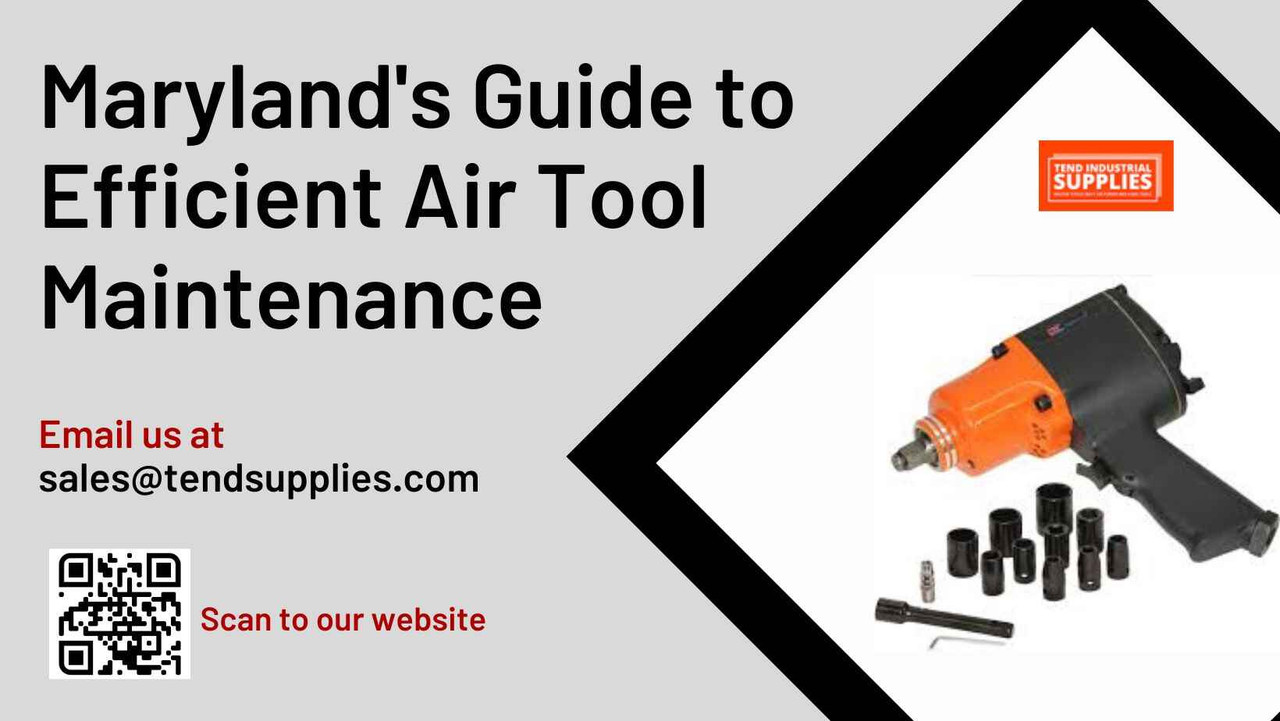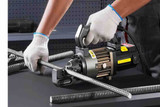Maryland's Guide to Efficient Air Tool Maintenance
Key takeaway
Introduction
Maintaining air tools is crucial for ensuring their longevity and optimal performance, especially in industrial settings where they play a pivotal role in everyday tasks. In Maryland, where varying weather conditions, including high humidity, can pose additional challenges, effective maintenance becomes even more important. Proper care not only extends the life of your tools but also enhances productivity by minimizing downtime caused by malfunctions. This guide will walk you through essential tips to keep your air tools in peak condition, specifically designed for Maryland’s climate.
Understanding Air Tool Basics
Air tools, also known as pneumatic tools, are commonly used in various industries for tasks like sanding, drilling, grinding, and painting. These tools are powered by compressed air, making them lightweight and highly efficient. Some of the most frequently used air tools include impact wrenches, sanders, air hammers, and spray guns. For each of these tools, regular maintenance is crucial to avoid costly repairs and ensure consistent performance.
Each air tool consists of several key components such as the air compressor, motor, hoses, and fittings. Ensuring these parts are functioning correctly is essential for maintaining efficiency. By understanding how each component works and its maintenance needs, you can address potential issues before they become major problems.
Routine Maintenance Checklist
Maintaining air tools regularly prevents breakdowns and prolongs their lifespan. Here’s a simple checklist for daily, weekly, and monthly maintenance:
- Daily Maintenance Tasks:
- Inspect the tools for any visible wear or damage.
- Ensure that all hoses and connections are tight and free from leaks.
- Wipe down the tools to remove dirt and debris that could clog filters or damage components.
- Weekly Maintenance Tasks:
- Check the air pressure in the compressor to ensure it's within the correct range for each tool.
- Listen for any unusual noises that could indicate internal problems.
- Clean or replace air filters, as dirt and debris can affect performance.
- Monthly Maintenance Tasks:
- Check for internal wear on key parts like seals and gaskets.
- Test each tool's performance and recalibrate if needed.
- Lubricate moving parts (if applicable) to prevent friction and ensure smooth operation.
By following this maintenance schedule, you can avoid unexpected repairs and extend the life of your tools.
Lubrication: The Key to Long-Lasting Tools
One of the most important aspects of air tool maintenance is lubrication. Lubrication minimizes friction between moving parts, reducing wear and preventing the tool from overheating during extended use. Without proper lubrication, the internal components of air tools can degrade faster, leading to breakdowns.
For Maryland's climate, it’s important to choose the right lubricant. Since the state often experiences high humidity, you’ll need lubricants that protect against moisture to prevent rust and corrosion. Most air tools require lubrication every time they are used, but it’s essential to check your tool's manual for specific recommendations.
Steps for lubricating your air tools:
- Disconnect the tool from the air supply.
- Apply a few drops of oil directly into the air inlet.
- Reconnect the tool and run it for a few seconds to allow the oil to circulate through the internal components.
Using high-quality air tool oil ensures smooth operation and adds a protective layer to the tool’s internal parts. It’s recommended to use oils that are designed to work in humid conditions to further protect against rust and corrosion.
Preventing Rust and Corrosion in Maryland’s Humid Climate
Maryland's humid climate can be tough on air tools, especially when it comes to preventing rust and corrosion. Moisture in the air can seep into the tools, causing metal components to rust, which compromises performance and shortens the tool's lifespan. To protect your tools from these damaging effects, consider these best practices:
- Proper Storage: Always store air tools in a dry place. Use moisture-resistant storage cabinets or containers to keep the tools safe from humidity.
- Use Rust Inhibitors: Applying rust inhibitors or protective coatings to your tools can help prevent moisture from settling on the metal surfaces.
- Regular Inspections: Frequently inspect tools for signs of rust. If rust begins to form, clean it off immediately to prevent it from spreading.
By taking these preventive measures, you’ll safeguard your investment and ensure that your tools remain in good working condition despite Maryland’s moisture-rich environment.
Proper Storage Solutions for Air Tools
Storing air tools properly is a vital part of maintaining their longevity and performance, especially in areas like Maryland, where the climate can be quite humid. Proper storage can protect your tools from environmental damage, such as moisture, dust, and temperature fluctuations. Here are some effective storage tips to ensure your tools stay in top condition:
- Use a Dry, Controlled Environment: Always store air tools in a cool, dry place to prevent moisture from settling inside the tools. A climate-controlled workshop or storage area is ideal to avoid the buildup of rust and corrosion.
- Protective Storage Units: Investing in protective storage units, such as lockable tool cabinets with moisture-resistant lining, can offer an extra layer of protection. Consider silica gel packs or dehumidifiers inside the cabinets to absorb any excess moisture.
- Hang Tools Properly: Hanging air tools on racks or pegboards helps avoid scratches or damage from stacking them. Ensure the hanging mechanisms do not strain hoses or other delicate parts.
- Tool Covers and Cases: Whenever possible, store your air tools in their original cases or use covers specifically designed for each tool. This protects them from dust, moisture, and accidental impacts.
By following these storage practices, you minimize the risks associated with environmental exposure and maximize the tools' lifespan.
Addressing Common Air Tool Problems
Despite regular maintenance, air tools may occasionally encounter issues. Knowing how to troubleshoot and address these problems can save you time and money. Here are some common air tool problems and how to fix them:
- Low Power Output: If your tool is not producing the expected power, check the air compressor’s pressure settings. Ensure that the pressure matches the tool’s requirements. Also, inspect for any blockages in the air hoses or valves that may restrict airflow.
- Air Leaks: Leaking air is one of the most common issues with pneumatic tools. To address this, tighten all fittings and connections. If the leak persists, replace worn or damaged seals or O-rings.
- Overheating: Overheating can result from inadequate lubrication or prolonged continuous use. Make sure to lubricate the tool as per the manufacturer’s instructions, and allow the tool to cool down after extended use.
- Unusual Noises: If your air tool starts making strange sounds, it may indicate internal wear or damage. Disassemble the tool (following the manufacturer’s instructions), clean out any debris, and replace worn parts if necessary.
By identifying these common problems early, you can prevent more significant damage and ensure the tools function efficiently.
Choosing the Right Air Compressor for Your Tools
Your air tools are only as good as the compressor supplying them with power. Choosing the right air compressor is essential for ensuring optimal performance and longevity. Here are some factors to consider when selecting the right air compressor for your workshop in Maryland:
- Compressor Size: The size of the compressor should match the air consumption of your tools. For heavy-duty tools, choose a compressor with a larger tank capacity (60 gallons or more) and a higher CFM (Cubic Feet per Minute) output.
- Portability: If you plan to move your tools around the workshop or job site frequently, a portable air compressor with wheels and handles will be beneficial.
- Noise Levels: Maryland’s urban areas often have noise ordinances, so selecting a quieter model (below 75 dB) may be a good idea to avoid disruptions.
- Oil-Free vs. Oil-Lubricated: Oil-free compressors require less maintenance but may not last as long as oil-lubricated compressors, which are more durable but require regular oil changes.
Selecting the right compressor will ensure that your air tools function at their best and help you avoid unnecessary wear and tear.
Maintenance Tools You Should Have in Your Workshop
Having the right tools on hand for maintaining your air tools is critical for ensuring smooth operations. Consider adding the following maintenance tools to your workshop:
- Air Tool Oil: A necessity for lubricating your tools and ensuring their longevity.
- Torque Wrench: Useful for tightening and loosening bolts on air tools, ensuring the right level of torque without over-tightening.
- Cleaning Brushes: Ideal for removing debris and dirt from air tool components.
- Air Pressure Gauge: Helps monitor and adjust the air pressure to match the tool’s specifications.
- Spare O-Rings and Seals: Always keep spare parts handy to replace worn or damaged seals that can cause air leaks.
Having these maintenance essentials readily available helps you address issues quickly and efficiently, minimizing downtime.
How to Extend the Lifespan of Your Air Tools
Proper care and regular maintenance can significantly extend the lifespan of your air tools. Here are some best practices to follow:
- Regular Cleaning: After each use, clean your air tools thoroughly to remove any debris, dust, or residue. Use compressed air to blow out any dirt lodged inside the tools, particularly in vents and moving parts.
- Proper Lubrication: Lubricate your air tools regularly to reduce friction between moving parts, prevent rust, and keep the tool running smoothly. Always use manufacturer-recommended oils or lubricants for the best results.
- Inspect for Wear and Tear: Before and after using your air tools, inspect them for any signs of wear, such as cracked hoses, worn-out seals, or damaged parts. Address these issues immediately to avoid costly repairs or accidents.
- Avoid Overloading: Air tools are designed for specific workloads. Avoid pushing the tools beyond their capacity, which could lead to overheating or premature failure.
- Store Tools Properly: As discussed earlier, proper storage is crucial in protecting your tools from environmental damage. Use racks, cases, or cabinets to store tools away from moisture, dust, and temperature extremes.
By following these practices, you can extend the life of your air tools and ensure they continue to perform at their peak.
FAQs on Air Tool Maintenance
1. How often should I lubricate my air tools?
You should lubricate your air tools daily, especially before and after use, to ensure smooth operation and prevent wear. Check your tool’s manual for specific lubrication requirements.
2. What air pressure is ideal for operating air tools?
The ideal air pressure depends on the tool you’re using. Most air tools operate between 90 and 120 PSI. Always check the manufacturer’s specifications to ensure you are using the correct pressure level.
3. How do I prevent air tools from rusting?
Keep air tools dry by storing them in a moisture-free environment, regularly oiling them, and ensuring your compressor has a moisture filter to reduce water entering the tool.
4. Can I use regular motor oil to lubricate air tools?
No, it’s best to use air tool oil specifically designed for pneumatic tools. Motor oil is too thick and can cause gumming and improper lubrication.
5. What’s the best way to store air hoses?
Coil your air hoses properly and store them on hose reels or racks to prevent kinks, cracks, and damage. Avoid leaving them exposed to direct sunlight or extreme temperatures.
Conclusion
Maintaining your air tools properly is essential for maximizing their performance and extending their lifespan. From regular cleaning and lubrication to choosing the right air compressor and storage solutions, proper maintenance will keep your tools operating efficiently for years to come. By following the tips in this guide, you can protect your investment and get the most out of your air tools.
For high-quality air tools, compressors, and maintenance supplies, visit Tend Industrial Supplies. Our wide selection of tools and expert advice can help you maintain a productive and efficient workshop, whether you’re in Maryland or anywhere else.









